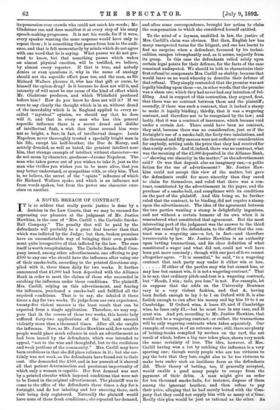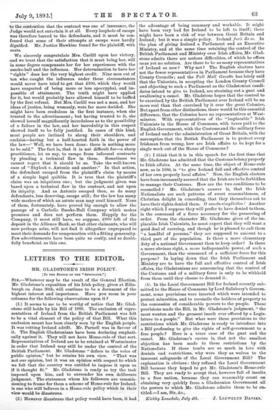A NOVEL BREACH OF CONTRACT.
IT is so seldom that really poetic justice is done by a decision in the Law Courts, that we may be excused for expressing our pleasure at the judgment of Mr. Justice Hawkins, in the case of "Mrs. Carlin v. the Carbolic Smoke- Ball Company." The penalty that will be paid by the defendants will probably be a great deal heavier than that which was inflicted by the Judge; but then, broken promises have an uncomfortable way of bringing their own punish- ment quite irrespective of that inflicted by the law. The case itself is worth recapitulating. The Carbolic Smoke-Ball Corn. punyissued, among other advertisements, one offering to pay MOO to any one who should have the influenza after using one of their smoke-balls, according to the printed directions sup- plied with it, three times daily for two weeks. It further announced that £1,000 had been deposited with the Alliance Bank in order to meet the claims of those who succeeded in catching the influenza under these conditions. The plaintiff, Mrs. Carlin, relying on this advertisement, and fearing the influenza, purchased a smoke-ball and fulfilled all the required conditions. That is to say, she inhaled it three times a day for two weeks. To judge from our own experience, twenty-five violent sneezes is the least result that can be expected from a single application. Therefore, we may sup- pose that in the course of those two weeks, this heroic lady suffered forty-two applications of the ball, and sneezed violently more than a thousand times. After all, she caught the influenza. Now, as Mr. Justice Hawkins said, few sensible people would place much reliance in such an advertisement as had been issued by the defendants, which was intended to appeal, "not to the wise and thoughtful, but to the credulous and weak portions of the community." Mrs. Cavil may have been credulous in that she did place reliance in it ; but she cer- tainly was not weak, as the defendants have found out to their cost. She demanded the £100, and in her pursuit of it showed all that patient determination and persistent importunity of which only a woman is capable. Her first demand was met by a printed circular which imposed conditions that were not to be found in the original advertisement. The plaintiff was to come to the office of the defendants three times a day for a fortnight, and do her inhaling and her sneezing there, each visit being duly registered. Naturally the plaintiff would have none of these fresh conditions ; she repeated her demand,
and after some correspondence, brought her action to claim the compensation to which she considered herself entitled.
To the mind of a layman, unskilled in law, the justice of Mrs. Carlill's claim was obvious. But then, English law has many unexpected turns for the litigant, and one has learnt to feel no surprise when a defendant, favoured by its techni- calities, escapes triumphantly and, as it seems, unjustly from its grasp. In this case the defendants relied solely upon certain legal points for their defence, for the facts of the case remained undisputed. We should be loth to characterise their first refusal to compensate Mrs. Carlill as shabby, because that would leave us no word whereby to describe their defence of that refusal. They simply contended that the promise was not legally binding upon them—or, in other words, that the promise- was a sham one, which they had never had any intention of ful- filling. And in support of this contention, they argued, first, that there was no contract between them and the plaintiff; secondly, if there was such a contract, that it lacked a stamp. to make it legally binding; thirdly, that it was a wagering contract, and therefore not to be recognised by the law; and lastly, that it was a contract of insurance, which became void under a certain Act. There could have been no contract,. they said, because there was no consideration, just as if the- fortnight's use of a smoke-ball, the forty-two inhalations, an& the thousand and fifty sneezes were not sufficient consideration for anybody, setting aside the price that they had received for- that costly article. And if, indeed, there was no contract, what- was the meaning of the £1,000 deposited in the Alliance Bank,. —" showing our sincerity in the matter," as the advertisement said ? Or was that deposit also an imaginary one,—a polite fiction for the use of advertisement ? Mr. Justice Haw- kins could not accept this view of the matter, but gave the defendants credit for more sincerity than they cared to claim for themselves, and ruled that there was a con- tract, constituted by the advertisement in the paper, and the purchase of a smoke-ball, and compliance with its conditions on the part of the plaintiff. And this being so, he farther ruled that the contract, to be binding, did not require a stamp upon the advertisement. The idea of the agreement between the two parties wanting a stamp is delightfully ingenious, and not without a certain humour of its own when it is remembered what constituted that agreement. But the most interesting part of the judgment was the answer to the third: objection raised by the defendants, to the effect that the con- tract was a wagering one—a bet, in fact—and therefore irrecoverable by law. Mr. Justice Hawkins is an authority upon betting transactions, and his clear definition of what- constituted a wager and what did not, could not well have been put more concisely ; though with one part of it we cannot altogether agree. "It is essential," he said, "to a wagering contract that each party may under it either win or lose.
If either of the parties may win but cannot lose, or may lose but cannot win, it is not a wagering contract." That is to say, that ordinary pitch-and-toss is a wagering contract,. but "Heads, I win ; tails, you lose," is not. For example, let us suppose that the odds on the University Boatrace vary in a very violent fashion, and that A, having been foolish enough to lay 5 to 1 on Oxford with B, is also- foolish enough to run after his money and lay him 10 to 4 on Cambridge. If Oxford wins, A loses £9, and if Cambridge wins, he loses only £1,—but he must lose in any case, and B. must win. And yet, according to Mr. Justice Hawkins, that would not be a wagering contract ; or rather, the transactions will be only wagering contracts when taken separately. Our example, of course, is of an extreme case; still, there are plenty of betting-books compiled by novices on the turf, the net result of which, before a big race takes place, shows very much the same certainty of loss. The idea, however, of Mrs.. Carlill having won a bet by catChing the influenza is a very sporting one; though surely people who are too virtuous to pay the bets that they lose, ought also to be too virtuous to make bets under such an insidious form as the defendants did. Their theory of betting, too, if generally accepted, would enable a good many people to escape from the payment of their debts. A man might give an order for ten thousand smoke-balls, for instance, dispose of them among the ignorant heathen, and then refuse to pay their price, alleging that he had merely betted with the Com- pany that they could not supply him with so many at a:time.. Really this plea would be just as rational as the other. As to thecontention that the contract was one of insurance, the Judge would not entertain it at all. Every loophole of escape was therefore barred to the defendants, and it must be con- fessed that some of their attempts at escape were hardly .dignified. Mr. Justice Hawkins found for the plaintiff, with -costs.
We sincerely congratulate Mrs. Carlihl upon her victory, and we trust that the satisfaction that it must bring her, will in some degree compensate her for her experiences with the smoke-ball and the influenza. Her determination to have her " rights " does her the very highest credit. Nine men out of ten who caught the influenza under these circumstances• -would never have tried to get that £100, which they would have suspected of being more or less apocryphal, and im- possible of attainment. The tenth might have applied for it, but would probably have allowed himself to be baffled by the first refusal. But Mrs. Carlin was not a man, and her ideas of justice, being womanly, were far more decided. She might have been credulous in the first instance, when she -trusted to the advertisement.; but having trusted to it, she showed herself magnificently incredulous as to the possibility of a failure in the law, and her incredulity in this respect showed itself to be fully justified. In cases of this kind, most people are inclined to shrug their shoulders, and -exclaim—having but a half-hearted faith in the power of the law—" Well, we have been done : there is nothing more to be said." The fact is, that it is not difficult for—a sharp practitioner, let us say, to escape from informal contracts by pleading a technical flaw in them. Sometimes we cannot regret that it should be so. Take the well-known case of " Shylock v. Antonio and another." In that action, the defendant escaped from the plaintiff's claim by means -of a simple legal quibble. It is true that the plaintiff's -claim was an iniquitous one ; but the judgment given was based upon a technical flaw in the contract, and not upon its iniquity. And as Antonio escaped then, so do many -defendants, less deserving, escape still; for the law has many wide meshes of which an astute man may avail himself. None of them, fortunately, have proved big enough to allow the passage of a Carbolic Smoke-Ball Company which makes promises and does not perform them. Happily for the Company, it must still have, we suppose, 2900 left of the deposit in the Alliance Bank, so that other claimants, who will now perhaps arise, will not find it altogether unprepared to meet their demands for compensation with a fitting generosity. Few advertisements have been quite so costly, and so doubt- -fully beneficial, as this one.



















































 Previous page
Previous page